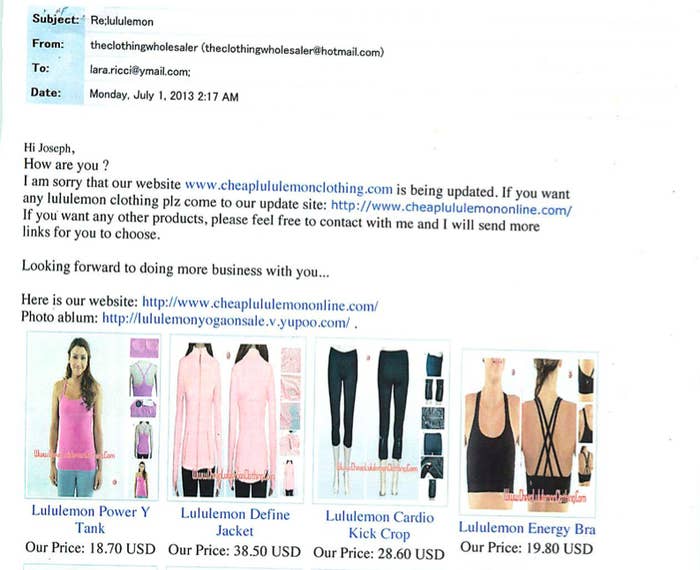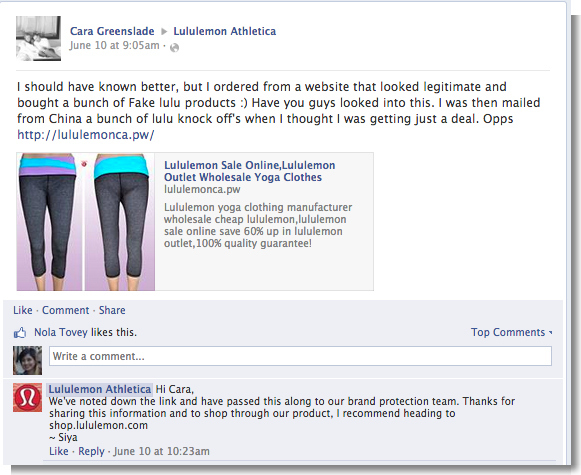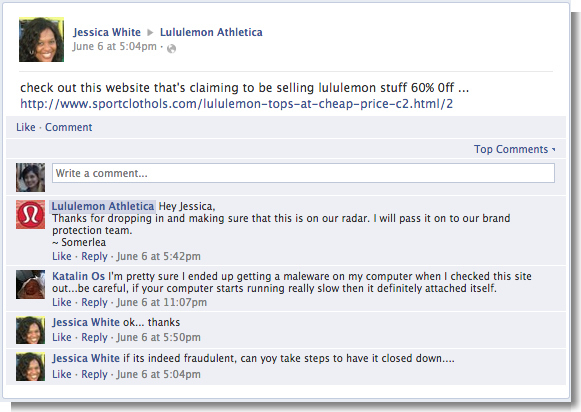
Lululemon Athletica filed a lawsuit accusing nine people of selling fake Lululemon gear online — without quite knowing who they are.
The yoga-inspired athletic clothing retailer brought the complaint against nine John Does, who have been operating about 50 websites for counterfeit Lululemon apparel, largely registered to addresses in China. The lawsuit charges that some of the fraudulent sites, such as CheapLululemonClothing.com, LululemonWholesale.com, and LululemonOutlets.com, are named to "further dupe consumers into believing that the infringing websites are operated, sponsored, or endorsed by Lululemon."
Lawyers in the case, which was filed June 25 in New York district court, have been able to figure out aliases and email addresses for some of the fake website registrants based on names used to obtain payments through Western Union. But they have not been able to positively identify the criminals — for example, John Doe 1's fake sites are registered to "King Star Trade Co., Ltd.," with an address in Guangzhou, Guangdong, Baiyu, China, but searches by the lawyers "produce no credible information about a King Star Trade Co. located at this street address," according to the complaint.
Lululemon's Facebook page has been peppered with questions from customers about the authenticity of such websites in recent months, which representatives said they were reporting to a brand protection team. The Vancouver-based company's reputation for quality and grassroots marketing efforts enable it to sell $98 yoga pants and $64 tank tops mostly at full price, giving it one of the highest sales per square foot in retail, after Apple and Tiffany & Co. Lululemon also commands those high prices by limiting how much of its products are available at any one time, and cycling in new styles quickly, making these fake websites an even larger threat.
A judge granted Lululemon a temporary restraining order, demanding internet registries make the domain names nontransferrable and for financial institutions to locate associated accounts and restrain them. However, highlighting how difficult the search is, by the time PayPal discovered and restrained four accounts associated with the defendants late last month, the balances were at zero.
Even more worrisome (and ironic) is that after Lululemon lawyer Joseph Gioconda made an email address to investigate the fake websites, he got a message inviting him to a newly made URL after CheapLululemonClothing.com was shut down, according to a July 2 filing. The unknown sender said the other site "was closed temporary."
E-mail from Lululemon Fraudster

"Our product integrity and guest satisfaction are very personal for us," a Lululemon spokesperson wrote in an emailed statement. "We take counterfeit matters very seriously so our guests can have confidence they are purchasing authentic Lululemon products. As this is pending litigation, we cannot comment on specifics further to the court filings."
Gioconda said in a June 27 filing that his firm used proprietary "RogueFinder Investigative Software" to analyze the domain names and retrieve possible email addresses for each of the registrants. The company also conducted test transactions that resulted in the delivery of fake yoga pants, tank tops, T-shirts, jackets, towels, and yoga mats, among other items.
E-commerce "rogue websites" attract more than 53 billion visits a year and can threaten more than 19 million American jobs, lawyers for Lululemon said.
A judge issued a preliminary injunction for the 52 trademark-infringing sites to "remain on registry lock and registry hold until trial, or pending further order of the court" on July 3.
Lululemon is recovering from selling a batch of overly-sheer yoga pants in March and is searching for a new chief executive officer.


